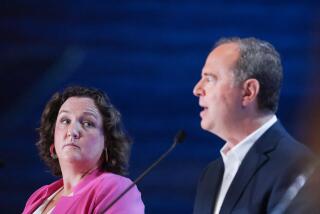Well-Heeled ‘Rangers’ Oil Bush Reelection Machine
- Share via
GREENSBORO, Ga. — In the secluded, 8,000-acre splendor of the Reynolds Plantation luxury resort, Georgia showered President Bush with money last month.
Jamie Reynolds, 52, presided. The self-described pond-fishing country boy, whose blue jeans and five-day stubble belied a fortune that includes the Plantation complex, had rounded up hundreds of his friends and neighbors; each forked over $2,000 for a few sips of wine, some finger food and 26 minutes with the president.
Also key to the event was Eric Tanenblatt, 36, chief of staff to Georgia’s first Republican governor in 130 years. Working on his home computer in Atlanta, he had created a network of key contributors, each charged with drawing additional donors.
Because of their efforts, more than 600 Georgians gathered under one tent on the night of June 20. Checks were sent by hundreds of others they had contacted. The total take for Bush’s reelection campaign: at least $2.25 million. That’s more than he raised in Georgia throughout his first run for the presidency.
For their sweat, Reynolds and Tanenblatt won the title of “ranger” -- that’s the Bush campaign’s designation for supporters who account for at least $200,000 in contributions.
Reynolds and Tanenblatt are among a growing corps of these financial field generals in a campaign poised to shatter all known U.S. benchmarks for political giving.
The money raised in Georgia fed into a pot of more than $34 million the Bush campaign amassed nationwide through June 30. Bolstered by recent fund-raisers in Texas and elsewhere, the total has topped $45 million.
The cash would continue to flow this month, when Bush and Vice President Dick Cheney are scheduled to appear at big-money events from Minneapolis to San Diego. Ultimately, the campaign’s bottom-line could top $200 million, easily surpassing the record of roughly $100 million raised in Bush’s 2000 race.
The president’s war chest already dwarfs the totals for any his Democratic rivals. And the vast sums funneled to Bush have left many campaign-finance reformers concerned about the agendas of the donors -- and the rangers who are enlisting them.
The campaign’s 23 rangers include such well-heeled, long-time Bush supporters as Carl H. Lindner, a former chief executive of the Chiquita Brands food company who owns the Cincinnati Reds baseball team and one of the largest insurance companies in the Midwest. Also on the list: Silicon Valley financier Gregory Slayton, Missouri venture capitalist Sam Fox and Merrill Lynch & Co. Chief Executive Stanley O’Neal.
A closer look at Reynolds and Tanenblatt and the fund-raiser they organized reveals much about how this new cash machine works.
Documents the Bush campaign filed with the Federal Election Commission show that tens of thousands of the Georgia dollars came from top executives of some of the largest corporations based in the state: Coca-Cola, Home Depot, UPS, Aflac insurance and Total Systems Services, one of the world’s largest processors of credit-card transactions.
Two influential, Georgia-based law firms also were well represented. At one of them -- King & Spalding, which advertises that its Washington office “occupies an ideal perch ... adjacent to the White House” -- nearly 30 attorneys ponied up a total of more than $30,000.
Such donations are typical of fund-raising patterns nationwide. But the extra work by Reynolds and Tanenblatt help explain Bush’s success.
Aided by the GOP’s strong showing in Georgia’s 2002 elections and solid support for Bush statewide, the pair cajoled donations from a wide range of givers. FEC documents show that the list includes farmers, small businessmen, rural professionals, a flight attendant and pro football coach -- each of whom contributed the $2,000 maximum allowed for individuals.
One recent Bush administration decision has led some Democrats to wonder about possible quid pro quos.
Just three weeks after the Reynolds Plantation fund-raiser, the White House announced it selected Sea Island, Ga., as the site of next year’s G-8 summit.
Among the $2,000 contributors at the fund-raiser was Alfred W. “Bill” Jones III, chairman of the firm that owns the island’s main hotel. The gathering of leaders of the world’s eight wealthiest industrialized nations is expected to pump hundreds of millions of dollars of business into the island and other parts of the state.
Bush campaign officials, administration sources, Tanenblatt, Reynolds and Jones said there was no connection between the fund-raiser and the choice of Sea Island to host the G-8 meeting. The site, they said, was picked mainly for security reasons.
“I don’t think it was a payoff,” Tanenblatt said. “I think the venue sold itself.”
He did acknowledge that close ties between Georgia Gov. Sonny Perdue and the White House didn’t hurt Sea Island’s chances. “You have to assume that having a friendly governor is helpful,” he said.
Tanenblatt and Reynolds said that in their push for donations, they offered nothing in return -- other than the brief time with Bush and the prospect of four more years of him in the White House.
On the surface, Tanenblatt and Reynolds seem an unlikely combination.
Tanenblatt, a transplant from Long Island, N.Y., is comfortable in pinstriped suits and Georgia’s Gold Dome capital building. Reynolds, with his deep, rural drawl, is more at home atop a tractor clearing acres of fresh-bought land -- “bush-hogging,” they call it here.
But key similarities between them run deep: Both have known and worked hard for Bush and his family for years, both are now hard-wired into the White House, and both insist their efforts grow out of an ideological and personal mission for a man and a cause.
Reynolds’ office in Greensboro, a small town near the intersection of Interstate 20 and Highway 44, is hardly overwhelming: three small rooms in a building the size of a trailer. But from here he has built a small real estate empire.
It is anchored by the Reynolds Plantation, which includes 2,000 lakefront homes, a championship golf course and the Ritz-Carlton that opened last year.
Asked to explain his commitment to Bush, he pointed to a photograph on his office wall of him with Bush. “It was in Texas in ’97 or ‘98, when Bush was still governor,” Reynolds said. “The purpose of the trip was to get him to run for president.”
Reynolds continued: “I really connected with then-Gov. Bush. He really relaxed me. I really believed in him.”
Until then, Reynolds’ only political work was for Georgia Democrat Zell Miller, a two-term governor and now U.S. senator. The common thread for Reynolds, he said, was that Bush and Miller “are straight shooters.”
In the photo, Reynolds and his son are on one side of Bush. On the other is a white-haired man who is now the chief financial officer of Bush’s reelection campaign: Mercer Reynolds Jr., Jamie’s cousin.
He’s Jamie’s partner in the Linger Longer Development Co. that has made the Reynolds Plantation a gold-plated resort. He’s also a multimillionaire financier based in Cincinnati.
Along with partner William O. DeWitt Jr., who is also one of Bush’s rangers, Mercer Reynolds helped bail Bush out of an early oil venture in Texas. The two joined with him in buying the Texas Rangers baseball team, and then raised millions of dollars for his 2000 presidential campaign and inauguration.
After Bush took office, he appointed Mercer Reynolds U.S. ambassador to Switzerland, a job he recently resigned to take his post with the reelection team. It was Mercer Reynolds who steered the campaign’s first major fund-raiser outside Washington to the Reynolds Plantation. Jamie Reynolds had less than a month to prepare; he promised a relatively modest take of $1 million.
He sent out 1,500 letters promoting the event, 600 of them with a personal note attached. “I went through the Rolodex and sent one to everyone I knew,” he recalled.
And the Rolodex yielded more than he imagined. Those who attended included local teachers, contractors and a dozen or so employees of the Reynolds Plantation.
Overall, residents of his local county -- home to 15,000 people -- accounted for more than 10% of the night’s contributions.
“People in small-town Georgia, they love the president. I’m telling you, they believe in him,” Reynolds said. “They believe he’s a man of good character, of good faith and of conviction.”
Reynolds added: “There were 130 hometowns represented at that event, from the northwest corner of Georgia down to the southeastern tip.”
For that, much of the credit goes to Tanenblatt.
Unlike Reynolds, Tanenblatt was steeped in politics from an early age. Raised a Republican, his ties to the party intensified during a Washington internship while studying economics at Atlanta’s Emory University. “I met Ronald Reagan, and I don’t know what it was, but something came over me,” he said.
Soon after he graduated, Tanenblatt went to work for the man who would become his mentor in GOP politics, Georgia’s late U.S. Sen. Paul D. Coverdell. He worked for him in Georgia and then in Washington, when Coverdell ran the Peace Corps.
In 2000, Tanenblatt was co-chairman of the Bush campaign in Georgia. Bush carried the state easily, and soon after, Tanenblatt joined forces with Perdue in what would become Georgia’s landmark gubernatorial election last year.
“What we have seen here is a radical shift,” Tanenblatt said of Perdue’s upset victory. “We’re basically becoming a Republican state at the state level, where we never have been.”
That, Tanenblatt added, explains much of Bush’s financial windfall in Georgia.
As for his own agenda in helping to open financial spigots for Bush, he said: “I wasn’t doing it to become a ranger. I was doing it because I support the cause, and I support the president.”
He paused, then added: “I truly do all this stuff -- and you’re going to think this is terribly corny -- for altruistic reasons. I have two small kids, and I want to make sure they grow up in a healthy environment.”
More to Read
Get the L.A. Times Politics newsletter
Deeply reported insights into legislation, politics and policy from Sacramento, Washington and beyond. In your inbox twice per week.
You may occasionally receive promotional content from the Los Angeles Times.





